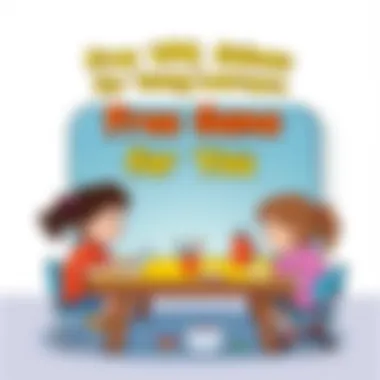Discover Engaging Free VPK Games for Early Learners


Intro
In the realm of early childhood education, the importance of play cannot be overstated. Free VPK games stand as a vibrant avenue for fostering both cognitive and social skills in young learners. These games don’t just offer entertainment; they provide a structured yet enjoyable pathway for children to grasp essential concepts while having fun. Whether a child is counting apples, identifying shapes, or learning the alphabet, these free tools have a role to play.
This article embarks on a journey to delve into the diverse world of VPK games. As we explore, we'll examine the types of games available, their educational advantages, and practical ways these games can enhance the learning experience for children. With the right resources, parents and educators can create a rich learning environment right at home.
Why Explore Free VPK Games?
In today's digital age, technology grants us unique opportunities to engage learners in meaningful ways. Utilizing free VPK games allows for:
- Interactive Learning: Engaging games hold children's attention and make education dynamic.
- Skill Development: Focused games can target specific skills such as language, math, and social interaction.
- Accessibility: The vast availability of free games makes it easy for families to incorporate education into everyday play.
Through this guide, we aim to facilitate a deeper understanding of how free VPK games can significantly support young minds, steering them on a path toward a successful future.
Understanding VPK Games
Understanding the nature and purpose of VPK games is crucial for those involved in early childhood education. These games are not just about passing time; they’re essential tools that promote learning among young children. When parents, educators, and caregivers grasp the significance of VPK games, they can better leverage these resources to foster a rich learning environment.
Definition of VPK
VPK stands for Voluntary Prekindergarten, a program aimed at assisting children in their foundational years before formal schooling. The core idea behind VPK is to ensure that every child is prepared to start kindergarten with the skills they need to succeed.
To put it simply, VPK emphasizes learning through play. Free VPK games are designed to engage young learners in a fun way, making them more likely to absorb important concepts. For example, a game revolving around counting might use colorful images of apples to help children visualize and understand numbers.
History of VPK Programs
VPK programs have their roots in early childhood education initiatives that dates back several decades. The concept gained traction in the early 2000s when states began recognizing the need for a structured prekindergarten experience. Many believe VPK emerged from successful models seen in countries with robust early education systems.
One pivotal moment in the history of VPK was the establishment of free programs that became universally available across various states. Parents and communities rallied around this initiative, acknowledging its potential to reduce educational disparities. Over time, the framework expanded to include a wide variety of games and activities that facilitate learning, making the history of VPK a story of growth and adaptation.
Importance in Early Education
The importance of VPK games in early education cannot be overstated. They offer multifaceted benefits ranging from cognitive development to social interaction. Engaging with these games allows children to explore and develop critical skills in an enjoyable environment.
- Cognitive skills: Children build essential thinking skills and enhance their memory by playing games that require logical reasoning.
- Social interaction: Many VPK games foster teamwork and collaboration, helping children learn to communicate effectively.
- Emotional growth: Games provide a safe space for children to express their feelings and build confidence.
"Playing is not just fun, it’s the most natural way for young minds to learn."
In concluding this section, it’s clear that VPK games serve as a bridge to a richer educational experience for young learners. By understanding their definition, historical context, and importance, stakeholders can harness their true potential in shaping the future of children.
Types of Free VPK Games
Free VPK games play a pivotal role in early childhood education, providing a fun and interactive way for children to learn essential skills. These games are not only entertaining but also lie at the intersection of play and learning, making them highly effective for young minds. Understanding the various types of free VPK games available helps parents and educators tailor experiences that resonate with children’s learning styles and developmental stages.
Educational Games
Math Games
Math games are an engaging way for children to grasp fundamental mathematical concepts. They often transform abstract numbers into tangible experiences that young learners can relate to. A key characteristic of math games is their ability to make counting, addition, and subtraction feel like play rather than chores. This aspect makes them a popular choice in the educational toolkit, as children are more likely to engage willingly.
One appealing feature of many math games is their use of visuals and sounds, which can reinforce learning through multiple senses. For instance, games that employ colorful shapes or animated characters promote engagement by making math problems visually stimulating.


However, one disadvantage may be that certain games could overwhelm children with complexity, making it hard for them to connect with the material. It's crucial to choose math games that are age-appropriate to ensure that children remain engaged without feeling frustrated.
Language Games
Language games provide a delightful avenue for children to explore vocabulary and grammar. These games are critical in developing early literacy skills, encouraging children to experiment with words and sentence structures. The standout characteristic of language games is their interactive nature, which often involves storytelling or role-play activities that captivate young imaginations.
What makes them particularly beneficial is their ability to enhance communication skills through fun interactions. For example, games that require kids to practice pronunciation or spell words can deeply engage them with language learning.
However, while they can enrich vocabulary, the challenge lies in ensuring the content isn't too advanced, making it inaccessible. Games must strike a balance to attract and retain the attention of young learners without being pedantic.
Science Games
Science games take children on a journey of exploration and discovery, sparking curiosity about the world around them. They often incorporate elements of observation and experimentation, teaching fundamental scientific concepts in a manner that's digestible and enjoyable. The distinct characteristic of science games is their focus on inquiry-based learning, allowing children to ask questions and seek answers organically.
Unique features, like interactive experiments or virtual field trips, enhance the learning experience while allowing kids to develop critical thinking and observational skills. However, complexity can be a hurdle — if a game is too challenging, it might not deliver the intended learning outcomes. Thus, it’s essential that these games align with the child's developmental level and interest spectrum.
Interactive Learning Games
Puzzle Games
Puzzle games encourage logical thinking and spatial awareness in a playful setting. They typically require players to solve problems, thereby honing critical thinking skills while having fun. Their hallmark quality is adaptability; they can range from simple jigsaw puzzles to complex problem-solving scenarios, catering to various cognitive levels.
The benefit of these games lies in their ability to keep children engaged as they work toward completing a challenge. However, they can sometimes lead to frustration if they are not properly aligned with the child's skill level, which might dampen their enthusiasm for learning.
Memory Games
Memory games focus on enhancing recall and concentration. These games often include matching pairs or sequence recall tasks, which exercise the brain by challenging youngsters to remember positions or items. A defining feature of memory games is the playful use of images, sounds, or movements that make them engaging and effective at reinforcing memory skills.
They serve as a substantial benefit in developing cognitive skills, but there’s a pitfall; if not sufficiently challenging, they can easily lose a child's interest. Therefore, it’s important to regularly introduce new elements to keep these games fresh and stimulating.
Simulation Games
Simulation games provide a realistic platform for children to engage with concepts in a controlled environment. These games can mimic real-life scenarios, from farming to running a restaurant, allowing young learners to experiment without real-world consequences. A noteworthy characteristic is their ability for children to learn through trial and error, maximizing experiential learning.
The unique feature of simulation games is that they often encourage teamwork or competition, instilling social skills alongside academic ones. However, one challenge is their demand on attention and property usage, which might overwhelm some younger kids. It’s important that these games are introduced thoughtfully to ensure a positive experience.
Benefits of Free VPK Games
The benefits of free VPK games extend far beyond mere entertainment. These games are designed with educational objectives at heart, integrating learning with play. They serve as vital tools in developing critical skills in young learners, paving the way for success in their future educational journeys. By facilitating a blend of cognitive, social, and emotional growth, these games form a well-rounded experience that assists children in becoming more capable and confident individuals.
Cognitive Development
Critical Thinking Skills
Critical thinking skills involve the capacity to analyze and evaluate information effectively. In the realm of VPK games, these skills are often nurtured through challenges that require children to make decisions. For instance, games like Kidspiration present problems that need solving, encouraging players to think analytically and assess different solutions. The key characteristic of critical thinking is the ability to question assumptions. This aspect is particularly beneficial in a VPK context as it promotes creativity and adaptability in thought processes.
One unique feature is the gamified scenarios where children can experiment with choices, reflecting a cause-and-effect relationship in a safe environment. The advantage of fostering critical thinking through free VPK games is that it prepares children to face real-world challenges, teaching them the value of reasoning and evidence in decision-making.
Problem-Solving Abilities
Problem-solving abilities are closely linked with how children approach obstacles and challenges. Free VPK games provide numerous opportunities for kids to encounter dilemmas they need to navigate effectively. For example, a game may require a child to identify the best path through a maze or solve a riddle. The hallmark of these games lies in their ability to engage children in processes where trial and error is encouraged.
This experiential learning forms the basis for resilience and persistence; as children tackle various scenarios, their confidence in their problem-solving skills grows. Additionally, the unique feature of having multiple solutions to a problem fosters creative thinking, making it a popular inclusion in free VPK games—enhancing adaptability and resourcefulness in learners.


Social Skills Enhancement
Teamwork and Collaboration
Working together on tasks is essential for social development in young children, and VPK games often foster environments where teamwork is paramount. By engaging with peers in cooperative games, children learn valuable lessons in sharing responsibilities and valuing different perspectives. For instance, games like Community Builders encourage players to constructively discuss and collaborate on decisions.
The key characteristic here is that through interaction, kids develop interpersonal skills that are crucial for future relationships. This is particularly beneficial in a classroom setting or extracurricular activities, where collaboration is often required. The advantage of this social connection is that it not only improves teamwork but also helps children build friendships, creating a sense of belonging and community.
Communication Skills
Effective communication is a vital skill for young learners, and free VPK games equip children with tools to articulate thoughts and emotions. Games often require kids to explain strategies or negotiate with teammates, facilitating an environment that promotes verbal and non-verbal communication.
One strong aspect of communication within these games is the feedback mechanism. Players learn to express their ideas clearly and listen to others, honing their ability to articulate feelings effectively. The advantage of developing strong communication skills early in life cannot be overstated; it lays a foundation for their academic and social success.
Emotional Growth
Confidence Building
Building confidence in young children is a crucial objective of educational games. Free VPK games offer a platform from which children can experience successes, be it by completing a level or mastering a skill. This positive reinforcement encourages them to take initiative and pursue challenges without the fear of failure.
The key characteristic of confidence building through games is that children see their progress in real time, which reinforces their self-worth. A unique feature of this process is how scalable challenges can be tailored to individual skill levels, ensuring that every child experiences achievable victories. One of the most significant advantages is the sense of accomplishment children feel, which encourages them to engage more in learning activities.
Stress Management
In today's fast-paced world, even children can experience stress. Free VPK games provide a fun distraction while teaching kids how to manage their emotions amid challenges. Through playful engagement, children practice coping mechanisms that can help reduce anxiety levels. For instance, colorful, engaging games might use humor and friendly characters to ease tension, guiding children in how to approach problems calmly.
The underlying principle of stress management in these games is learning through play. By accepting that mistakes are part of the learning process, kids become more resilient. This resilience is a unique feature that translates to real-life situations, granting children tools they can carry beyond the virtual world and into their daily lives. The advantage of this aspect cannot be neglected, as emotional intelligence is paramount to succeeding in various life situations.
Selecting Appropriate Free VPK Games
Choosing the right free VPK games is pivotal, not just for mere engagement but more so for the holistic development of young learners. Ensuring that the games selected are truly beneficial hinges on two critical considerations: age-appropriateness and alignment with learning objectives. Both aspects serve as guiding stars for parents and educators, aiming to create enriching experiences tailored to a child's developmental stage and educational requirements.
Age-Appropriateness
When navigating the sea of available games, it’s essential to consider the age-appropriateness of each option. Young learners are like sponges, absorbing information and skills at a remarkable pace, but they also have varying capabilities and interests depending on their age. Games must cater to these dynamics.
- Developmental Milestones: Each age group has specific milestones in areas like cognitive reasoning, motor skills, and social interaction. For instance, a kindergarten game introducing the concept of numbers should be more visual and tangible, such as interactive counting with colorful animals, rather than abstract numerical problems.
- Engagement: A game designed for toddlers may focus on basic shapes or colors through engaging visuals and sounds, whereas older preschoolers may benefit from games that involve more complex problem-solving or storytelling elements. Getting the right fit not only keeps children interested but also effectively supports their learning. A game that's too easy can lead to boredom, while one that's too difficult can cause frustration, ultimately hindering the learning process.
The classification of games often comes with age labels. Parents and educators are encouraged to heed these guidelines closely, as deviating too far from them might not yield the intended learning experience.
Alignment with Learning Objectives
Once age appropriateness is established, the next step is ensuring that the selected games align with educational goals. By intentionally choosing games that meet specific curriculum standards or developmental targets, adults can maximize the educational value of playtime.
- Curricular Integration: For example, if you are focusing on early literacy skills, select games that offer phonics practice or vocabulary enhancement. These games typically use storytelling or interactive reading sessions that fill learning gaps while still being enjoyable.
- Skills Development: Moreover, consider games that enhance cognitive skills and soft skills through play. If a child is learning to share or work in a team, cooperative games that require joint effort can reinforce these social skills effectively.
Games providing structured instructions and feedback can help kids understand their learning progress, reinforcing positive outcomes.
In summary, the intersection of age-appropriateness and alignment with learning objectives not only enhances the educational journey of young learners but also cultivates a love for learning. By being selective, both parents and educators can ensure that the free VPK games serve as a stepping stone in building a solid foundation for future academic success.
By keeping these elements in mind while exploring free VPK games, you're not merely finding something for kids to do; you’re actively shaping future-ready, skilled learners. Consider visiting helpful resources such as ed.gov or childdevelopmentinfo.com for guidance in your selection process.


Integrating VPK Games into Learning
Integrating VPK games into learning creates a bridge between play and education, allowing young learners to grasp new concepts through an engaging medium. In this section, we will explore notable elements and advantages that come to light when VPK games are woven into the educational fabric. The idea is not only to entertain children but also to foster their cognitive, social, and emotional development in an enjoyable way.
Gamification Techniques
Gamification techniques play a crucial role in making learning interactive and engaging. They transform standard educational content into captivating experiences. Let’s dive into two primary gamification methods used in VPK games.
Point Systems
Point systems are a popular feature in many VPK games. They create an environment where children can earn points based on their performance, promoting a sense of achievement. The key characteristic of a point system is its ability to track progress while actively motivating kids to participate more.
This specific aspect helps in developing friendly competition among peers, which can be beneficial. Notably, children often strive harder to achieve higher scores, making learning an exciting adventure. However, while points act as a powerful motivator, care must be taken to ensure that the focus remains on learning rather than just competing. This balance is pivotal; otherwise, children may prioritize points over skill acquisition.
Reward Mechanisms
Speaking of rewards, these mechanisms often come hand-in-hand with point systems. Reward mechanisms involve granting children tangible or intangible rewards once they achieve certain milestones in the game. They can range from virtual badges to unlocking new levels or features in the game. The charm of reward mechanisms lies in their immediacy—children receive instant gratification for their efforts.
This immediate feedback loop can enhance motivation and reinforce desired behaviors among learners. However, an over-reliance on rewards can lead to the expectation of prizes for every effort, which may not be sustainable in traditional educational environments. As such, it's essential to strike a balance and foster intrinsic motivation alongside external rewards.
Combination with Traditional Learning
Integrating VPK games with traditional learning approaches opens doors to a more balanced educational experience. It allows for seamless transitions between hands-on activities and structured learning. For example, a lesson on shapes could be paired with a corresponding VPK game that reinforces recognition and understanding of geometric forms through play.
These combinations facilitate active learning, where children engage with subjects in a multifaceted manner. Educators and parents can design learning plans that alternate between direct instruction and game-based learning. This holistic approach caters to various learning styles and can significantly boost a child's retention of information.
Ensuring a Safe Online Experience
In today’s digital age, ensuring a safe online experience while engaging with free VPK games is crucial. With children accessing countless games and educational resources, parents and caregivers must be vigilant. Safety online not only includes protecting privacy but also guiding children towards appropriate content. Below, we explore the importance of these considerations as we navigate the world of digital learning.
Privacy Concerns
One of the prime focuses around online safety is privacy. Young learners are not always aware of personal information they might unwittingly share on the internet. This raises several concerns:
- Data Collection: Many online games often collect data on users, and children might not understand why sharing their name, location, or even preferences can be harmful.
- Inappropriate Marketing: With many free games relying on ads, there’s a risk of young viewers encountering inappropriate advertisements or content they are not suited for.
- Cyberbullying Risks: While playing online games, children might get involved in social interactions that can sometimes lead to bullying or peer pressure.
To combat these, parents should closely monitor their child’s online interactions and set clear rules about what is acceptable to share. Utilizing parental controls effectively can also ensure that data is managed securely.
Navigating Appropriate Content
Navigating through appropriate content requires a proactive approach from educators and caregivers alike. Here are a few tips to consider:
- Review Games Before Usage: Spend a little time checking out the games beforehand. Read reviews and watch a few gameplay videos if available.
- Use Trusted Sources: Opt for websites or platforms known for educational purposes. For instance, sites like PBS Kids or Starfall provide safe environments filled with engaging content.
- Set Guidelines: Establishing clear guidelines about what games can be played and why is essential. This helps children understand the reasons behind selecting age-appropriate content.
- Encourage Dialogue: Foster an environment where kids feel comfortable discussing what they stumble upon online. Encourage questions about games, and don't shy away from discussing any concerns that arise.
“An informed child is a safe child,” is a phrase that sums up the essence of these discussions.
Future of Free VPK Games
The landscape of early childhood education is evolving rapidly, and the future of free VPK games plays a pivotal role in this transformation. As technology innovates continuously, various elements shape the way these educational tools develop, directly impacting young learners and their developmental journey. Understanding these shifts is not just important; it is vital for parents, educators, and stakeholders invested in nurturing the minds of tomorrow.
One of the notable trends is the integration of technological innovations that enhance the quality and reach of free VPK games. These innovations aren't just about games becoming flashier or more interactive; they enhance educational content in ways that resonate with young minds. We’re witnessing advances such as adaptive learning algorithms, which can tailor experiences to suit the individual learning pace of each child. This personalized approach ensures that learning is not one-size-fits-all, but rather a pathway that accommodates unique learning styles.
Beyond technology, another exciting facet is expanding access and resources. As internet availability rises, even in remote areas, the prospect of free VPK games reaching a wider audience grows stronger. Educators and parents can now tap into a rich vein of resources that were once limited to urban settings. This democratization of resources means that every child, regardless of geographic or socioeconomic barriers, has the opportunity to engage with high-quality educational games.
"Access to free educational resources can drastically level the playing field, providing every child with the tools for success."
Looking ahead, a couple of important considerations come into play. First is the need for ongoing assessment of these games for effectiveness. As innovative technologies and strategies develop, it is paramount that both educators and developers continually evaluate the impact these games have on learning outcomes. Secondly, ensuring that resources are developmentally appropriate and aligned with educational standards will be key in fostering a constructive learning environment.
In summary, the future of free VPK games stands to significantly enrich early childhood education. The combination of technological innovation and broader access paves the way for a more inclusive, engaging, and tailored learning experience. For parents and educators alike, it’s crucial to stay informed about these changes, as they not only shape the educational tools available today but also lay the groundwork for tomorrow’s learning adventures.







